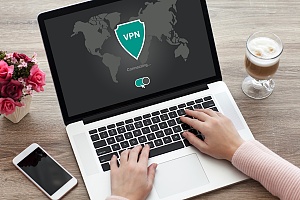
Top 6 Security Tips For Working Remotely
Businesses that choose to offer remote work face certain security threats that can have serious financial, legal, and reputational repercussions. To safeguard against cyber threats, employers handling a remote workforce should consider these IT security tips.
Install Antivirus Software on Devices
Antivirus software is an essential tool to help prevent cyberattacks and data breaches. While not every cyberattack can be prevented with antivirus software alone, it can be a valuable deterrent that helps prevent intrusion. Businesses often rely on powerful commercial IT security systems when in a workplace setting, but it can be challenging to maintain a commercial-level of IT security from remote locations. Installing quality antivirus software on all devices used for work purposes is a great place to start. A reliable security solution can drastically reduce the risk of a device getting infected by viruses or malware and can provide greater peace of mind.
Keep Networks & Computers Operating Systems Up to Date Regularly
Keeping computer operating systems and networks up to date not only improves the stability and performance of applications but can also help maximize security. Over time, computer systems can develop vulnerabilities that put them at risk for security gaps. Cybercriminals may choose to exploit these vulnerabilities and intrude on internet-equipped devices to steal sensitive information or corrupt important files or documents. Regularly updating computer operating systems and networks and installing available patches can help keep all programs and applications running smoothly and securely.
Consider Acquiring A Virtual Private Network

Agree & Implement a Secure Communication Medium
Modern businesses rely heavily on a wide range of communication mediums, such as email, messaging software, and video streaming solutions. However, not all forms of online communication are secure. It is important to use corporate communication mediums that are widely known to be secure and trustworthy. Businesses must also train employees on how to properly use these communication mediums to prevent serious IT errors that could put the company at risk, such as forwarding a private email to the wrong address. Take the time to research different corporate-level communication mediums available and acquire input from others in the workplace before implementation.
Perform Network & Cybersecurity Assessments
A network security assessment is essentially an audit performed on a computer system to look for potential security vulnerabilities that could be exploited by cybercriminals. The primary goal of these assessments is to keep all business networks, devices, and private data secure and out of the hands of unauthorized individuals. Performing a network security assessment can answer a lot of important questions, such as what systems are most likely to be breached, what would the impact of an IT security breach look like, what are the most common entry points for security breaches, and what can be done to help mitigate these types of attacks.
Hire an IT Security Company
 Remote-access technologies are commonly exposed to more threats due to the lesser degree of security protocols and policies. However, there are certain steps that business owners can take to help create a safe and secure remote work environment for employees. Hiring an IT security company can be highly beneficial for businesses that need assistance in developing a remote work security plan. With the help of an IT security professional, businesses can set up and communicate new remote work security policies, secure VPNs, address authentication and authorization issues, secure collaboration and communication channels, and obtain qualified IT support.
Remote-access technologies are commonly exposed to more threats due to the lesser degree of security protocols and policies. However, there are certain steps that business owners can take to help create a safe and secure remote work environment for employees. Hiring an IT security company can be highly beneficial for businesses that need assistance in developing a remote work security plan. With the help of an IT security professional, businesses can set up and communicate new remote work security policies, secure VPNs, address authentication and authorization issues, secure collaboration and communication channels, and obtain qualified IT support.
Reach Out To A Professional Managed IT Services Provider
More businesses are now allowing employees to work remotely due to concerns about health and social distancing. Hiring remote workers can also give a business a competitive edge. However, it is essential to implement certain IT security solutions to help keep sensitive business data secure. For more IT security tips when working remotely or to speak with a professional managed IT services provider, call TCB 24×7 Expert Network IT Support at 703.204.2958 or requesting a consultation online today.
